Sorry, Wrong Number Blu-ray Movie
HomeSorry, Wrong Number Blu-ray Movie 
Shout Factory | 1948 | 89 min | Not rated | Mar 21, 2023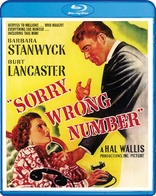
Movie rating
7 | / 10 |
Blu-ray rating
| Users | 0.0 | |
| Reviewer | 2.5 | |
| Overall | 2.5 |
Overview
Sorry, Wrong Number (1948)
Whilst on the telephone, an invalid woman overhears what she thinks is a plot to murder her.
Starring: Barbara Stanwyck, Burt Lancaster, Ann Richards (I), Wendell Corey, Harold VermilyeaDirector: Anatole Litvak
| Film-Noir | Uncertain |
| Thriller | Uncertain |
| Drama | Uncertain |
| Mystery | Uncertain |
Specifications
Video
Video codec: MPEG-4 AVC
Video resolution: 1080p
Aspect ratio: 1.37:1
Original aspect ratio: 1.37:1
Audio
English: DTS-HD Master Audio 2.0 Mono (48kHz, 24-bit)
1781 kbps
Subtitles
English SDH
Discs
Blu-ray Disc
Single disc (1 BD)
Playback
Region A (C untested)
Review
Rating summary
| Movie | 4.0 | |
| Video | 2.0 | |
| Audio | 3.5 | |
| Extras | 3.5 | |
| Overall | 2.5 |
Sorry, Wrong Number Blu-ray Movie Review
Reviewed by Dr. Stephen Larson March 27, 2023Cinematic narratives which employ multiple flashbacks became popular in Hollywood after it was used (most famously) in Citizen Kane (1941) and later in Mildred Pierce (1945). In her first and only screenplay, Lucille Fletcher experimented with the flashback structure for Sorry, Wrong Number (1948), an adaptation of the radio dramatization of her famous short play (read by this reviewer). At least half of Sorry, Wrong Number is confined to the bedroom of Leona Stevenson (Barbara Stanwyck), an invalid restricted to her Manhattan townhouse on Sutton Place. Leona is telephoning the office of her husband, Henry Stevenson (Burt Lancaster), but the wires get crossed. She overhears a conversation of two men plotting the murder of a resident on Second Avenue. Since the radio performance of Sorry, Wrong Number lasted twenty-two minutes, Fletcher had to expand on her original work. Her script spans nearly ninety minutes of screen time. Fletcher introduced subplots involving Sally Hunt Lord (Ann Richards), a former girlfriend of Leona's husband, Dr. Alexander (Wendell Corey), and Waldo Evans (Harold Vermilyea), a chemist and co-worker of Henry's at a large pharmaceutical company owned by Leona's father, James Cotterell (Ed Begley). While the flashbacks containing each of these characters makes this complicated narrative an engrossing one, it also makes the movie overall rather convoluted. Although Fletcher includes several scenes of Mr. and Mrs. Stevenson together in the flashbacks, I feel it needed at least one of them together in the present-day scenes. The script belabors too much in the flashbacks in gradually showing the deterioration of the Stevensons' marriage. It would have been an optimal starting point, for instance, if Fletcher had written a scene between Leona and Henry before the latter went to work and later traveled to Boston.
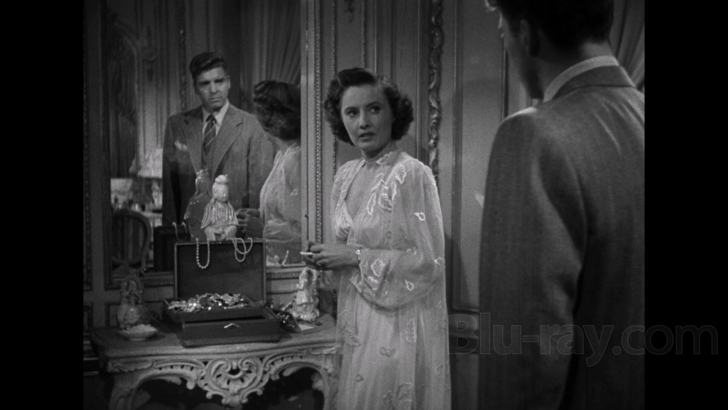
Still, Barbara Stanwyck (in her fourth and final Oscar-nominated role) and Burt Lancaster deliver fine performances. The film belongs to Stanwyck but the other big star is cinematographer Sol Polito, who helps make Sorry, Wrong Number the classic noir that it has become since receiving lukewarm reviews in 1948. Polito masterfully employs chiaroscuro lighting as he frames Waldo Evans standing while talking on the phone. This is a long take with Evans's figure darkly cast while details on his face slowly become visible. In addition, Polito does an admirable job of lighting the frame during a rainstorm and capturing one character in silhouette in a late scene. The cinematography is more of a strength of the picture than is the writing.
Sorry, Wrong Number Blu-ray Movie, Video Quality 
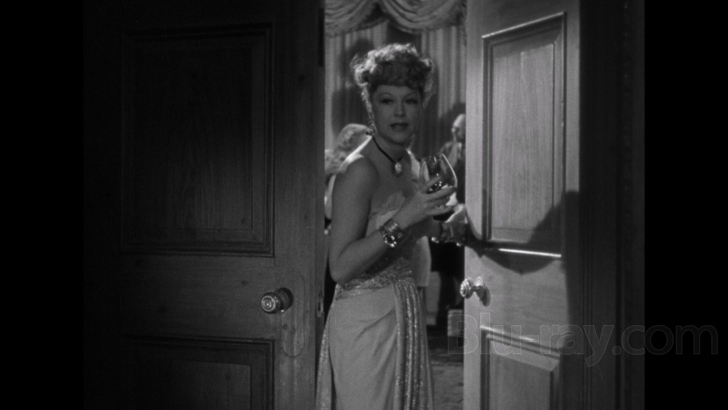
About three years ago, my colleague Jeff Kauffman reviewed the global Blu-ray debut of Sorry, Wrong Number, which was released by Australian label Imprint. Jeff pondered when and where this restoration took place and from my estimation, Paramount oversaw it in the US in 2009. Apparently, sometime TCM host Eddie Muller was involved in restoring the picture as you'll see him photographed in what looks like a video editing suite. Muller is backed by Dell PC monitors, one of which shows a still frame from Sorry, Wrong Number containing a TCR code. (Muller is filmed in the 2009 featurette, "Hold the Phone: The Making of Sorry, Wrong Number, which is a holdover from the Imprint disc.) Paramount only released a bare-bones DVD of the film in 2002. It would seem that some of the supplements rehashed on this disc from the Imprint would have become a "Special Collector's Edition" for the studio in the late 2000s or early 2010s. It's very possible that this older HD transfer was the basis for the Criterion-on-Demand video release in 2013.
Scream Factory's new release incorporates the MPEG-4 AVC codec which fits on a BD-50 (disc size: 44.42 GB). Scream encodes the feature at an average video bitrate of 34000 kbps. (The encode and bitrate is similar on the Imprint.) The good news is that no DNR has been employed as grain levels are rich. The inauspicious news is that the DI used for this disc has not truly been restored. Unfortunately, the grain is so thick at times that it makes the image too fuzzy. More problematic are age-related defects as well as single- and double-tramlines that mar the image. They invade the frame beginning in the scene where Leona argues with her father. The tramlines continue throughout the montage showing Henry and Leona's wedding and their honeymoon.
Jeff criticized Imprint's transfer for "many scenes looking aggressively filtered." I've watched the Imprint disc on my QLED display and a small 4K monitor. I would concur with Jeff that noise reduction has been used but grain is still visible for much of the presentation, even if it looks nowhere near as thick as it does on Scream's transfer. However, the picture on the Imprint does not display the same damage marks. You can clearly see the differences in the graphical comparison between the two transfers that I've put together under "Screenshots." Contrast and grayscale on the Imprint are noticeably superior. (Bear in mind, though, that Screenshot #36 is probably one of the worst on Imprint's transfer as it looks too dark.) Jeff only rated Imprint's video a 2.5/5.0. When examined alongside Scream's transfer, however, I would rate the video on the AU disc at least a 3.5/5.0.
Screenshot #s 1-13, 15, 17, 19, 21, 23, 25, 27, 29, 31, 33, 35, & 37 = Scream Factory 2023 BD-50
Screenshot #s 14, 16, 18, 20, 22, 24, 26, 28, 30, 32, 34, & 36 = Imprint 2020 BD-50
A dozen scene selections accompany the nearly 99-minute feature.
Sorry, Wrong Number Blu-ray Movie, Audio Quality 
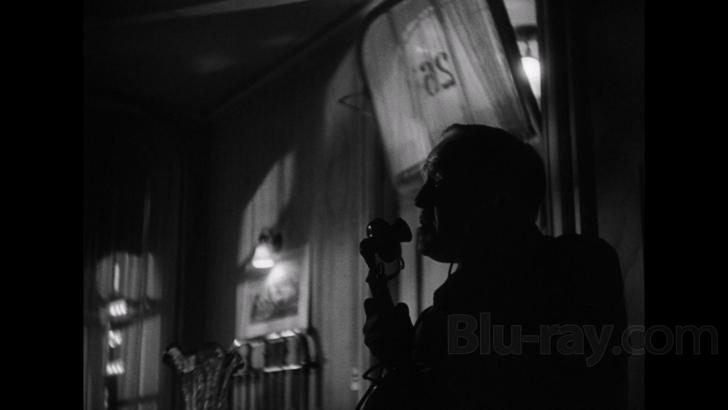
Scream has supplied a DTS-HD Master Audio Dual Mono mix (1781 kbps, 24-bit). Imprint encoded the audio as a PCM 2.0 mono but with a bit depth of 16. The two mixes sound similar but I would give the edge to Scream. The actors' delivery is competently rendered as I didn't need to resort to the optional English SDH to hear any of the dialogue. Background hiss is kept to a minimum. Franz Waxman's short score (about fifteen minutes of original music) sounds good on the DTS-HD MA track as it accents the composer's eerie strings. You can listen to Waxman's score and three of the movie's source cues on Intrada's two-disc compilation album, Double Indemnity: Film Noir at Paramount.
Sorry, Wrong Number Blu-ray Movie, Special Features and Extras 
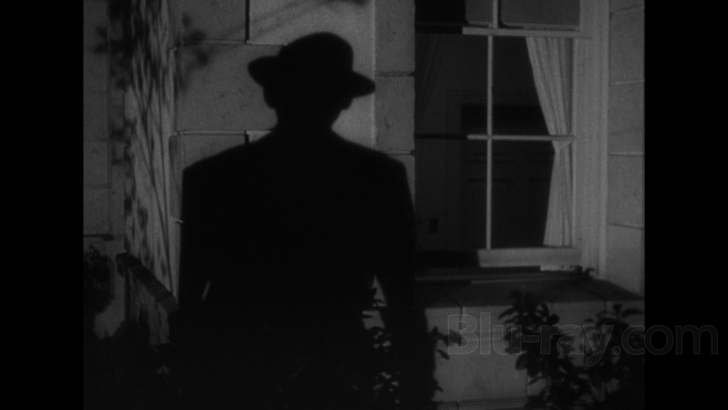
Scream Factory licensed all the bonus features from Imprint and has added one new extra.
- NEW Audio Commentary by Film and Pop Culture Podcasters Sam Hurley and Emily Higgins - this feature-length track was recorded exclusively for this Scream Factory release. Hurley is more casual in his remarks than Higgins, who is the more serious of the two. After the pair make comments about the beginning of the film, there's kind of a long gap. Indeed, there are several gaps throughout. The commentary gets better when Hurley and Higgins compare Sorry, Wrong Number to Rear Window. They spend a lot of their time unpacking the characters' choices and actions. Higgins has more historical facts about the production to offer than Hurley does. Overall, a decent track. In English, not subtitled.
- Audio Commentary by Film Noir Foundation Board Member Alan K. Rode - this feature-length track was recorded a few years ago for the Imprint Blu-ray and is definitely preferred by this reviewer over Scream's new commentary. Rode is very well-prepared. He delivers a wealth of anecdotes about the production and offers various details on the film's major players, producer, and director. I like that he doesn't neglect the critical contribution that Agnes Moorehead made to the radio drama, which paved the way for the movie. This commentary has far fewer gaps than the other one on this disc. In English, not subtitled.
- Introduction by Film Historian Eddie Muller (2:30, 1080p) - Muller probably recorded this intro in 2009. He touts Paramount's "new HD restoration" of the picture. He briefly summarizes the impact Fletcher's radio drama had on pop culture. Muller recalls first seeing Sorry, Wrong Number as a teen with his mother, who listened to the radio play during WWII. In English, not subtitled.
- "Hold the Phone: The Making of Sorry, Wrong Number" (31:25, 1080p) - this 2009 retrospective featurette is a co-production of Light Source & Imagery and Paramount. It is divided into four parts: Act One: "Answering the Call," Act Two: "Hollywood Comes a Callin'," Act Three: "Call-Backs and Crossed Lines," and Act Four: "Leaving a Message." We hear from Dorothy Herrmann, an author and the daughter of Lucille Fletcher and Bernard Herrmann, Ray Faiola of CBS Radio Services, radio pioneer Frank Bresee, radio broadcast legend Norman Corwin, author/film historian Drew Casper, author/film noir historian Eddie Muller, Smithsonian film scholar Max Alvarez, author/film noir historian Megan Abbott, and Burt Lancaster biographer Kate Buford. The program alternates between these talking heads and archival photographs from the radio show and the movie. I wished it had focused a bit more on the play. It offers a good overview of Sorry, Wrong Number's creation but lacks the comprehensiveness of longer making-of docs. All interviewees speak in English. The program isn't subtitled.
- Sorry, Wrong Number – 1950 Lux Radio Play with Barbara Stanwyck and Burt Lancaster (59:41) - the Lux Radio Theater hosted a live performance of the radio dramatization with Stanwyck and Lancaster reprising their roles. The play is divided into three acts with brief intermissions where the emcee promotes current movies and soap products. This is an expanded version than the more famous radio play since it includes flashbacks and additional scenes. It is very well done by the voice actors and certainly worth a listen. The play is delivered with the same still of Stanwyck in the background as the Imprint edition. In English, not subtitled.
- Sorry, Wrong Number – Filmed Performance of the Radio Play (28:37, 1080p) - as Jeff notes in his review, this is essentially a stage performance of Sorry, Wrong Number delivered at the Shadowland Theatre in Ellenville, New York. Since this was intended to be captured on video, I would have much preferred the actors memorize their lines rather than read from scripted pages, which they do here on music stands. It would have been just effective, if not more, if it were done as a traditional radio drama. The actress who portrays Leona Stevenson is the standout in the group. All actors recite their lines in English. The piece isn't subtitled.
- Theatrical Trailer (2:38, upconverted to 1080p) - Paramount's official trailer for Sorry, Wrong Number is presented in 1.33:1. The image has not been restored as it's littered with film artifacts. I would advise not watching this trailer first if you've never seen the movie.
- Photo Gallery (2:53, 1080p) - a slide show that mainly consists of publicity snapshots and on-set photographs from the production of Sorry, Wrong Number. The last four images are of a poster and some lobby cards. The gallery totals thirty-four stills. It's accompanied by excerpts from Franz Waxman's score and phone f/x.
Sorry, Wrong Number Blu-ray Movie, Overall Score and Recommendation 
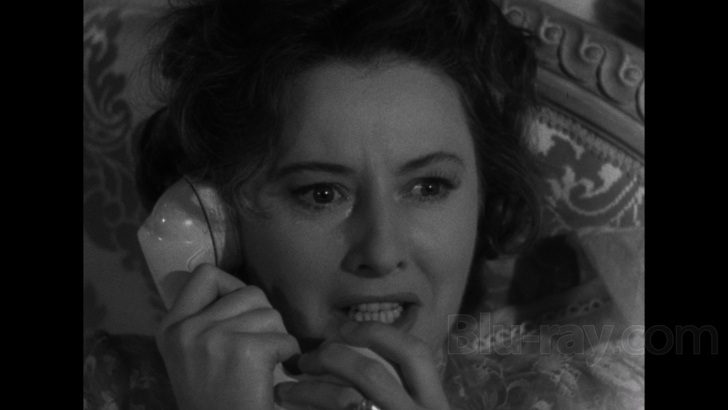
One of the main reasons Sorry, Wrong Number (1948) falls short of greatness is because original creator Lucille Fletcher tries too hard to expand her radio drama by dragging out too many subplots in the flashbacks. The film is still a very good noir and is deserving of its status as a genre classic thanks to DP Sol Polito's low-key lighting. I am very glad that I picked up the Imprint edition since the picture underwent more of a digital restoration than this version from Scream Factory. On the latter, the image looks quite good in some scenes but in others, it merely resembles an upscaled DVD. The Imprint disc, which is Region All, does have some DNR but it is currently the best edition to own. You can purchase it at Amazon US by either clicking here or here. The lone supplement added to the Scream release is a slightly above-average audio commentary. I would only grab the Scream for around $15 if you want to hear it. Otherwise, the Imprint originated all of the other extras so it makes it worth seeking out until the picture receives a fresh restoration.
Similar titles
Similar titles you might also like

Cause for Alarm!
1951

The Strange Affair of Uncle Harry
1945

Out of the Past
Warner Archive Collection
1947

The Chase
1946

Impact
Collector's Edition
1949

I Wake Up Screaming
Hot Spot
1941

The Man I Love
Warner Archive Collection
1947

The Dark Corner
1946

The Window
Warner Archive Collection
1949

Possessed
Warner Archive Collection
1947

Sudden Fear
1952

Notorious
1946

Scarlet Street 4K
1945

The Glass Key
1942

Another Man's Poison
1951

The Strange Love of Martha Ivers
4K Restoration
1946

Kiss of Death
Limited Edition to 3000
1947

The Grifters 4K
1990

Motherless Brooklyn
2019

The Killer That Stalked New York
1950